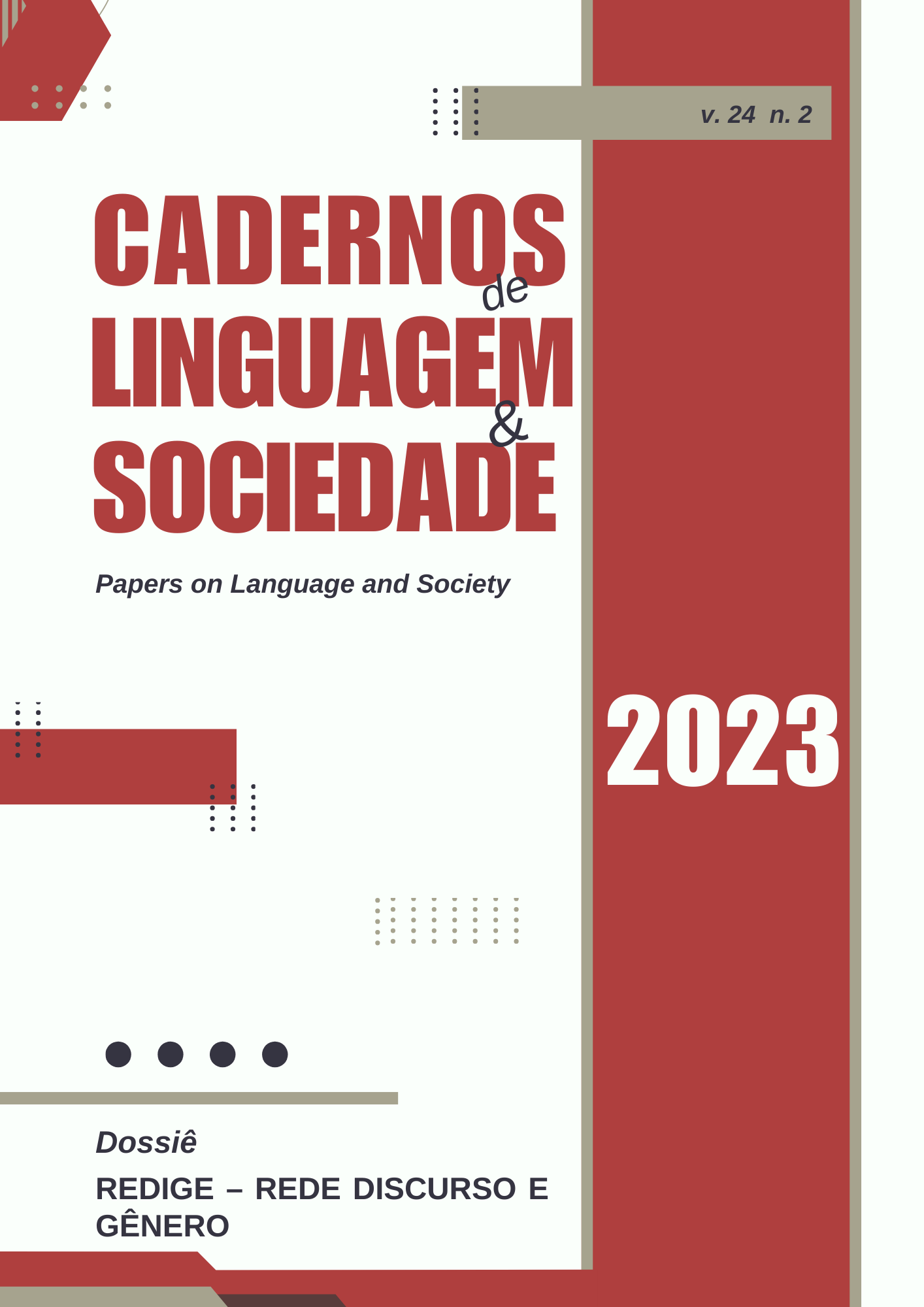VULNERABILIDADE LINGUÍSTICA EM AMBIENTES DIGITAIS E AS FORÇAS ESCALARES DA AMEAÇA CONTRA MULHERES
DOI :
https://doi.org/10.26512/les.v24i2.50742Mots-clés :
Ameaça, Cronotopo, Vulnerabilidade linguística, Citacionalidade, Conduta, Ambiente digitalRésumé
Este artigo busca ampliar o debate sobre as relações entre fala e conduta discutindo condições de vulnerabilidade linguística nas ameaças contra mulheres nas coarticulações entre interações digitais e face a face. Nossa análise foca no caso das ameaças à jornalista Vera Magalhães durante a campanha eleitoral de 2022. No ambiente digital, a citacionalidade dos enunciados ameaçadores leva ao crescimento exponencial de repetições. A circulação promove transformações dos textos digitais e as repetições evidenciam o “legado citacional”, ambas características sujeitas a mudanças de escala da cadeia textual à conduta violenta invocando um cronotopo da história de violência contra mulheres.
Téléchargements
Références
ANDRADE, Ana Olívia Costa de. “Contra tudo isto que está aí”: moralismo e política nas manifestações “Fora Dilma” em João Pessoa. 2016. 144 f. Dissertação (Programa de Pós-Graduação em Sociologia) - Universidade Federal da Paraíba, João Pessoa, 2016.
AUSTIN, John L. How to do things with words. London: Oxford University Press, 1962.
AUTORA 1 2021.
AUTORA 2, 2015.
BEAN, Judith. Gaining a public voice: a historical perspective on American women’s public speaking. In: BAXTER, Judith Mattson (org.). Speaking out: the female voice in public contexts. Londres: Palgrave Macmillan, 2006. p. 21–39.
BLOMMAERT, Jan. Chronotopes, Scales, and Complexity in the Study of Language in Society. Annual Review of Anthropology, v. 44, n. 1, p. 105–116, 2015.
BROWN, Wendy. Nas ruínas do neoliberalismo: A ascensão da política antidemocrática no ocidente. São Paulo: Editora Filosófica Politeia, 2019.
BUTLER, Judith. Discurso de ódio: Uma política do performativo. São Paulo: Editora da Unesp, 2021.
BUTLER, Judith. Excitable speech: A politics of the performative. New York: Routledge, 1997.
CAMERON, Deborah. Feminism and Linguistic Theory. 2. ed. Londres: Macmillan, 1992.
CAMERON, Deborah. Incidentes isolados. 2020. Disponível em: https://contxt.letras.ufrj.br/incidentes-isolados/. Acesso em: 18 ago. 2023.
CAMERON, Deborah. Verbal Hygiene. 2. ed. Abingdon: Routledge, 2012.
CAMERON, Deborah; SHAW, Sylvia. Gender, power and political speech: Women and Language in the 2015 UK General Election. Londres: Palgrave Macmillan, 2016.
CARRANZA, Isolda E. Digital first-order place, velocity and chronotope in globalized communication. In: PARINI, Alejandro; YUS, Francisco (org.). The Discursive Construction of Place in the Digital Age. New York: Rouledge, 2023. p. 47–65.
CESARINO, Letícia. O mundo do avesso: verdade e política na era digital. São Paulo: Ubu Editora, 2022.
CIBORGA, Coletiva et al. Etnografia digital: Um guia para iniciantes nos estudos da linguagem em ambientes digitais. Goiânia: Cegraf, 2022.
COLLINS, James; SLEMBROUCK, Stef. Goffman and globalization: frame, footing and scale in migration-connected multilingualism. In: COLLINS, James; SLEMBROUCK, Stef; BAYNHAM, Mike (org.). Globalization and language contact: Scale, migration, and communicative pratices. London: Continuum, 2009. p. 19–41.
GAL, Susan. A Semiotics of the Public/Private Distinction. differences, v. 13, n. 1, p. 77–95, 2002.
GOFFMAN, Erving. Footing. In: RIBEIRO, Branca Telles; GARCEZ, Pedro M. (org.). Sociolinguística interacional. 2. ed. São Paulo: Edições Loyola, 2013. p. 107–148.
HERRING, Susan C.; STOERGER, Sharon. Gender and (A)nonymity in Computer-Mediated Communication. In: EHRLICH, Susan; MEYERHOFF, Miriam; HOLMES, Janet (org.). The Handbook of Language, Gender, and Sexuality. 2. ed. Malden: Wiley Blackwell, 2014. p. 567–586.
IRVINE, Judith. When talk isn’t cheap: language and political economy. American Ethnologist, v. 16, n. 2, p. 248–267, 1989.
IRVINE, Judith; GAL, Susan. Language ideology and linguistic differentiation. In: KROSKRITY, Paul (org.). Regimes of Language: ideologies, polities and identities. Santa Fé: School of American Research Press, 2000. p. 35–84.
KROSKRITY, Paul. Language ideologies. In: DURANTI, Alessandro (org.). A Companion to Linguistic Anthropology. Malden: Blackwell, 2004. p. 496–517.
LITOSSELITI, Lia. Constructing gender in public arguments: the female voice as emotional voice. In: BAXTER, Judith (org.). Speaking out: the female voice in public contexts. Londres: Palgrave Macmillan, 2006. p. 40–58.
MCELHINNY, Bonnie. Theorizing Gender in Sociolinguistics and Linguistic Anthropology: Toward Effective Interventions in Gender Inequity. In: EHRLICH, Susan; MEYERHOFF, Miriam; HOLMES, Janet (org.). TheHandbook of Language, Gender, and Sexuality. 2. ed. Malden, MA: Blackwell Publishing Ltd, 2014. p. 48–67.
OCHS, Elinor. Indexing gender. In: DURANTI, Alessandro; GOODWIN, Charles (org.). Rethinking context: Language as an interactive phenomenon. Cambridge: Cambridge University Press, 1992. p. 335–358.
POSETTI, Julie et al. The chilling: global trends in online violence against women journalists. Unesco, 2021.
PRATT, Mary Louise. Utopias Linguísticas. Trabalhos em Linguística Aplicada, v. 52, n. 2, p. 437–459, 2013.
SANQUE, Douglas Roberto Knupp. “Pela família”; Múltiplas indexicalidades do signo “família” na comunicação do impeachment de Dilma Roussef. 2020. 289 f. Tese (Doutorado Interdisciplinar em Linguística Aplicada) - Universidade Federal do Rio de Janeiro, Rio de Janeiro, RJ, 2020.
SILVA, Daniel; ALENCAR, Claudiana de. Violência e significação: uma perspectiva pragmática. In: SILVA, Daniel; FERREIRA, Dina; ALENCAR, Claudiana de (org.). Nova Pragmática: Modos de fazer. São Paulo: Cortez, 2014. p. 259–282.
SILVERSTEIN, Michael. Indexical order and the dialectics of sociolinguistic life. Language and Communication, v. 23, n. 3–4, p. 193–229, 2003.
VARIS, Piia. Digital ethnography in the study of language, gender, and sexuality. In: ANGOURI, Jo; BAXTER, Judith (org.). The Routledge handbook of language, gender, and sexuality. New York: Routledge, 2021. p. 164–177.
VARIS, Piia; BLOMMAERT, Jan. Conviviality and collectives on social media: Virality, memes, and new social structures. Multilingual Margins, v. 2, n. 1, p. 31–45, 2015.
Téléchargements
Publié-e
Comment citer
Numéro
Rubrique
Licence
(c) Tous droits réservés Cadernos de Linguagem e Sociedade do Programa de Pós-Graduação em Linguística da UnB é licenciado sob uma Licença Creative Commons Atribuição-Uso não-comercial-Vedada a criação de obras derivadas 3.0 Unported. 2023

Cette œuvre est sous licence Creative Commons Attribution 4.0 International.
Autores/as que publicam nesta revista concordam com os seguintes termos:
Autores/as mantêm os direitos autorais e concedem à revista o direito de primeira publicação, sendo o trabalho simultaneamente licenciado sob a Creative Commons Attribution 4.0 International license que permite o compartilhamento do trabalho com reconhecimento da autoria do trabalho e publicação inicial nesta revista.



